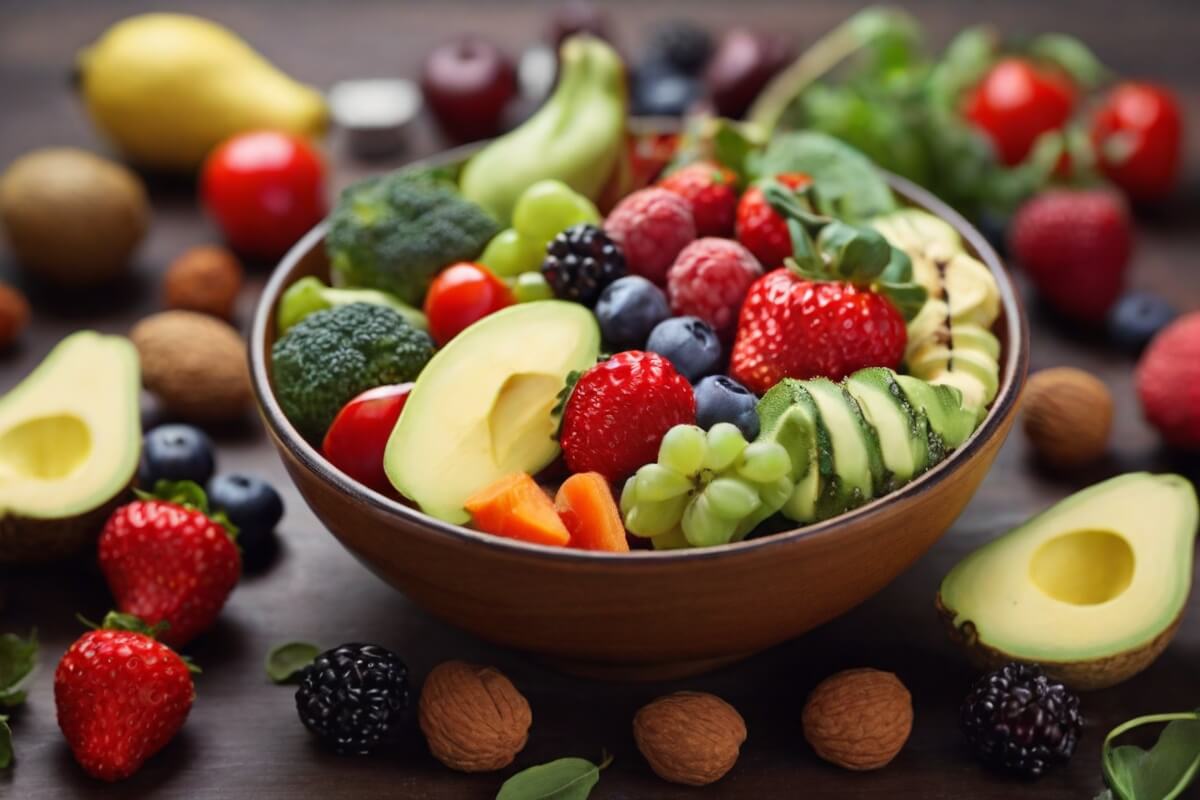Losing weight is a common goal for many people, especially at the beginning of a new year. However, not all diets are created equal, and some may be more effective, healthy, and sustainable than others. In this article, we will explore 10 of the best diets to lose weight in 2024, based on scientific evidence, expert opinions, and user reviews. We will also provide some tips and tricks to help you stick to your chosen diet and achieve your desired results.
How I Discovered the Power of Dieting

I have always struggled with my weight, ever since I was a child. I tried many different ways to lose weight, such as exercising, counting calories, taking supplements, and even fasting. However, none of them worked for me in the long term, and I always ended up gaining back the weight I lost, and sometimes even more.
I was frustrated and unhappy with my body and my health, and I felt like I had no control over my eating habits. I was constantly hungry, craving for junk food, and binge eating at night. I felt like I was trapped in a vicious cycle of dieting and overeating, and I didn’t know how to break free.
Then, one day, I stumbled upon an article that changed my life. It was about the benefits of dieting, not just for weight loss, but also for overall health and well-being. It explained how different diets can affect our metabolism, hormones, inflammation, gut health, and mood, and how choosing the right diet can help us balance our body and mind, and prevent or reverse many chronic diseases.
I was intrigued by the article, and I decided to give dieting a try. I did some research, and I found out that there are many different types of diets, each with its own pros and cons, and each suited for different goals and preferences. I decided to pick one that appealed to me the most, and that I thought I could stick to for a long time.
I started following the diet, and I was amazed by the results. I not only lost weight, but I also felt more energetic, happier, and healthier. I no longer felt hungry all the time, and I stopped craving for unhealthy foods. I enjoyed eating delicious and nutritious meals, and I felt satisfied and full. I also noticed improvements in my skin, hair, nails, and sleep quality. I felt like I had discovered a new way of living, and I never looked back.
10 Best Diets to Lose Weight in 2024

Of course, my experience is not unique, and many people have found success with dieting. However, as I mentioned before, not all diets are equally effective, and some may be better suited for you than others. Therefore, it is important to do your research, and find out which diet works best for your body, lifestyle, and goals.
To help you with that, I have compiled a list of 10 of the best diets to lose weight in 2024, based on the latest scientific research, expert opinions, and user reviews. These diets are not ranked in any particular order, as they all have their own advantages and disadvantages, and they all can help you lose weight, if followed correctly. However, some may be easier to follow, more enjoyable, or more beneficial for your health than others, depending on your personal preferences and needs.
Here are the 10 best diets to lose weight in 2024:
1. The Mediterranean Diet
The Mediterranean diet is one of the most popular and well-studied diets in the world, and for good reason. It is based on the traditional eating patterns of the people living in the Mediterranean region, such as Greece, Italy, Spain, and France, who are known for their longevity and low rates of chronic diseases.
The Mediterranean diet emphasizes the consumption of fruits, vegetables, whole grains, legumes, nuts, seeds, olive oil, fish, seafood, herbs, spices, and moderate amounts of dairy, eggs, poultry, and red wine. It limits the intake of red meat, processed meat, refined grains, added sugars, and saturated fats. It also encourages physical activity, social interaction, and mindful eating.
The Mediterranean diet has been shown to help with weight loss, as well as improve cardiovascular health, blood pressure, cholesterol levels, blood sugar levels, inflammation, cognitive function, and mood. It is also easy to follow, as it offers a lot of variety, flavor, and flexibility, and it does not require any calorie counting or strict rules.
2. The Keto Diet
The keto diet is another popular and effective diet for weight loss, especially for those who want to lose weight fast and have a high tolerance for fat. It is based on the principle of ketosis, which is a metabolic state where the body burns fat for fuel, instead of glucose, which is the main source of energy for most cells.
The keto diet requires a very low intake of carbohydrates, usually less than 50 grams per day, and a very high intake of fat, usually more than 70% of calories. It also allows a moderate intake of protein, usually around 20% of calories. The keto diet typically includes foods such as meat, poultry, fish, eggs, cheese, butter, cream, oils, nuts, seeds, avocados, and low-carb vegetables. It excludes foods such as grains, beans, fruits, starchy vegetables, sugar, and alcohol.
The keto diet can help with weight loss, as it suppresses appetite, boosts metabolism, and reduces insulin levels, which are all factors that promote fat burning. It can also improve blood sugar levels, cholesterol levels, blood pressure, and brain function, and may even have anti-inflammatory and anti-cancer effects. However, the keto diet can also have some side effects, such as keto flu, constipation, bad breath, muscle cramps, and nutrient deficiencies, and it may not be suitable for everyone, especially those with kidney, liver, or heart problems, or pregnant or breastfeeding women.
3. The Intermittent Fasting Diet
The intermittent fasting diet is not so much a diet, but rather a pattern of eating, that involves alternating periods of eating and fasting. There are many different ways to do intermittent fasting, such as the 16/8 method, where you eat within an 8-hour window and fast for the remaining 16 hours, or the 5:2 method, where you eat normally for 5 days and restrict your calories to 500-600 on 2 days.
The intermittent fasting diet can help with weight loss, as it reduces the overall calorie intake, and also enhances the hormonal and metabolic responses that favor fat burning. It can also improve blood sugar levels, insulin sensitivity, cholesterol levels, inflammation, and cellular repair, and may even extend lifespan and prevent age-related diseases. However, the intermittent fasting diet can also have some drawbacks, such as hunger, fatigue, irritability, headaches, and difficulty sleeping, and it may not be suitable for everyone, especially those with diabetes, low blood pressure, eating disorders, or pregnant or breastfeeding women.
4. The Paleo Diet
The paleo diet is based on the idea of eating like our ancestors, who lived in the Paleolithic era, before the advent of agriculture and civilization. It is also known as the caveman diet, the hunter-gatherer diet, or the primal diet, and it aims to mimic the diet of the humans who lived more than 10,000 years ago.
The paleo diet consists of foods that can be hunted, fished, or gathered, such as meat, poultry, fish, eggs, fruits, vegetables, nuts, seeds, and healthy oils. It excludes foods that are the result of modern farming and processing, such as grains, legumes, dairy, sugar, salt, and artificial additives. The paleo diet also encourages physical activity, outdoor exposure, and stress management.
The paleo diet can help with weight loss, as it eliminates many calorie-dense and nutrient-poor foods, and increases the intake of protein, fiber, and healthy fats, which can keep you full and satisfied. It can also improve blood sugar levels, cholesterol levels, blood pressure, inflammation, and gut health, and may even prevent or reverse some chronic diseases, such as diabetes, heart disease, and autoimmune disorders. However, the paleo diet can also have some limitations, such as being expensive, restrictive, and difficult to follow, and it may cause some nutrient deficiencies, especially in calcium, vitamin D, and iodine.
5. The Vegan Diet
The vegan diet is a type of vegetarian diet that excludes all animal products, such as meat, poultry, fish, eggs, dairy, honey, and gelatin. It is based on ethical, environmental, or health reasons, and it aims to reduce animal suffering, protect the planet, and improve human well-being.
The vegan diet consists of plant-based foods, such as fruits, vegetables, grains, legumes, nuts, seeds, and plant-based alternatives, such as soy milk, tofu, tempeh, seitan, and vegan cheese. It also avoids foods that contain animal-derived ingredients, such as whey, casein, lactose, gelatin, carmine, and shell
Alright, I will continue writing the article for you. Here is the rest of the article:
ac. The vegan diet can help with weight loss, as it tends to be lower in calories, fat, and cholesterol, and higher in fiber, antioxidants, and phytochemicals, which can boost metabolism, reduce appetite, and prevent fat accumulation. It can also improve blood sugar levels, cholesterol levels, blood pressure, inflammation, and gut health, and may even lower the risk of some cancers, diabetes, heart disease, and stroke. However, the vegan diet can also have some challenges, such as being socially difficult, requiring careful planning, and causing some nutrient deficiencies, especially in vitamin B12, iron, zinc, calcium, iodine, and omega-3 fatty acids.
6. The DASH Diet
The DASH diet stands for Dietary Approaches to Stop Hypertension, and it is designed to lower blood pressure and prevent or treat hypertension, which is a major risk factor for cardiovascular disease and stroke. It is also endorsed by the American Heart Association, the National Heart, Lung, and Blood Institute, and the World Health Organization.
The DASH diet emphasizes the consumption of fruits, vegetables, whole grains, low-fat dairy, lean protein, nuts, seeds, and healthy oils. It limits the intake of sodium, added sugars, saturated fats, and alcohol. It also encourages physical activity, weight management, and stress reduction.
The DASH diet can help with weight loss, as it reduces the overall calorie intake, and also improves the quality of the diet, by increasing the intake of fiber, potassium, calcium, magnesium, and antioxidants, which can enhance metabolism, lower blood pressure, and prevent water retention. It can also improve cholesterol levels, blood sugar levels, inflammation, and kidney function, and may even prevent or delay the onset of some chronic diseases, such as diabetes, heart disease, and stroke. However, the DASH diet can also have some drawbacks, such as being costly, time-consuming, and difficult to follow, and it may cause some side effects, such as headaches, dizziness, and fatigue, especially in the beginning.
7. The Zone Diet
The Zone diet is based on the concept of balancing the hormones that regulate metabolism, appetite, and inflammation, namely insulin, glucagon, and eicosanoids. It is also known as the 40-30-30 diet, as it requires a ratio of 40% carbohydrates, 30% protein, and 30% fat in each meal and snack.
The Zone diet consists of foods that have a low glycemic index, such as fruits, vegetables, whole grains, lean protein, and healthy fats. It excludes foods that have a high glycemic index, such as refined grains, sugar, potatoes, and rice. It also recommends taking supplements, such as omega-3 fatty acids, polyphenols, and probiotics, to enhance the hormonal and anti-inflammatory effects of the diet.
The Zone diet can help with weight loss, as it stabilizes blood sugar levels, reduces insulin resistance, and lowers inflammation, which are all factors that promote fat burning. It can also improve blood pressure, cholesterol levels, cognitive function, and mood, and may even have anti-aging and anti-cancer effects. However, the Zone diet can also have some limitations, such as being complicated, restrictive, and expensive, and it may cause some nutrient deficiencies, especially in fiber, calcium, and vitamin D.
8. The Atkins Diet
The Atkins diet is one of the most famous and controversial low-carb diets in the world, and it has been around since the 1970s. It is based on the idea that limiting carbohydrates and increasing protein and fat can induce a metabolic state called ketosis, which is similar to the keto diet, but less strict and more flexible.
The Atkins diet has four phases, each with different levels of carbohydrate intake and food choices. The first phase, called induction, is the most restrictive, and allows only 20 grams of net carbs per day, mostly from vegetables. The second phase, called balancing, gradually increases the carb intake, by adding more vegetables, fruits, nuts, and seeds. The third phase, called fine-tuning, adjusts the carb intake to the level that allows the dieter to maintain their weight loss. The fourth phase, called maintenance, allows the dieter to eat any food, as long as they do not exceed their personal carb tolerance.
The Atkins diet can help with weight loss, as it reduces appetite, boosts metabolism, and lowers insulin levels, which are all factors that promote fat burning. It can also improve blood sugar levels, cholesterol levels, blood pressure, and inflammation, and may even have neuroprotective and anti-epileptic effects. However, the Atkins diet can also have some side effects, such as constipation, bad breath, nausea, headache, and fatigue, and it may not be suitable for everyone, especially those with kidney, liver, or heart problems, or pregnant or breastfeeding women.
9. The Weight Watchers Diet
The Weight Watchers diet is one of the most popular and successful weight loss programs in the world, and it has been around since the 1960s. It is based on the principle of counting points, which are assigned to foods based on their calories, protein, fat, and fiber content. The dieter is given a daily and weekly point budget, which they can spend on any food they want, as long as they do not exceed their limit.
The Weight Watchers diet also provides online and in-person support, coaching, and guidance, as well as tools and resources, such as recipes, meal plans, trackers, and calculators, to help the dieter achieve their goals. It also encourages physical activity, behavioral changes, and healthy habits, such as drinking water, sleeping well, and managing stress.
The Weight Watchers diet can help with weight loss, as it creates a calorie deficit, and also improves the quality of the diet, by increasing the intake of protein, fiber, and nutrient-dense foods, which can keep the dieter full and satisfied. It can also improve blood sugar levels, cholesterol levels, blood pressure, and inflammation, and may even lower the risk of some chronic diseases, such as diabetes, heart disease, and stroke. However, the Weight Watchers diet can also have some drawbacks, such as being costly, time-consuming, and difficult to follow, and it may cause some side effects, such as hunger, cravings, and binge eating, especially in the beginning.
10. The Volumetrics Diet
The Volumetrics diet is based on the concept of energy density, which is the amount of calories per unit of volume of food. It is also known as the eat more, weigh less diet, as it allows the dieter to eat large portions of low-energy-dense foods, such as fruits, vegetables, soups, salads, and broth-based dishes, which can fill them up with fewer calories. It also allows moderate portions of medium-energy-dense foods, such as whole grains, lean protein, and low-fat dairy, which can provide essential nutrients and satisfaction. It limits small portions of high-energy-dense foods, such as fats, oils, nuts, seeds, sweets, and alcohol, which can add a lot of calories with little volume.
The Volumetrics diet can help with weight loss, as it reduces the overall calorie intake, and also improves the quality of the diet, by increasing the intake of fiber, water, vitamins, minerals, and antioxidants, which can enhance metabolism, lower blood pressure, and prevent fat accumulation. It can also improve blood sugar levels, cholesterol levels, inflammation, and gut health, and may even lower the risk of some cancers, diabetes, heart disease, and stroke. However, the Volumetrics diet can also have some challenges, such as being boring, bland, and repetitive, and it may cause some side effects, such as gas, bloating, and diarrhea, especially in the beginning.
How to Choose the Best Diet for You

As you can see, there are many different diets to lose weight in 2024, and each one has its own advantages and disadvantages. Therefore, it is important to choose the one that suits your personal preferences, needs, and goals, and that you can follow for a long time, without feeling deprived, stressed, or unhappy.
Here are some tips and questions to help you choose the best diet for you:
- What is your main goal? Do you want to lose weight fast, or slowly and steadily? Do you want to improve your health, or prevent or treat a specific condition? Do you want to change your body composition, or your appearance?
- What is your current health status? Do you have any medical conditions, allergies, intolerances, or sensitivities, that may affect your diet choices? Do you take any medications, supplements, or herbs, that may interact with your diet? Do you have any blood tests, measurements, or indicators, that may guide your diet decisions?
- What is your lifestyle? How much time, money, and energy do you have to devote to your diet? How often do you cook, eat out, or travel? How active are you, and what kind of exercise do you do? How much stress do you have, and how do you cope with it?
- What are your preferences? What kind of foods do you like, and what kind of foods do you dislike? What kind of foods do you crave, and what kind of foods do you avoid? What kind of foods are available, accessible, and affordable to you? What kind of foods are compatible with your culture, religion, or ethics?
- What are your challenges? What are the main obstacles or barriers that prevent you from following a diet? How can you overcome them, or minimize them? What are the main triggers or temptations that make you break a diet? How can you avoid them, or resist them?
- What are your supports? What are the main sources or resources that help you follow a diet? How can you use them, or increase them? Who are the people or groups that support you, or motivate you, or inspire you? How can you connect with them, or join them, or thank them?
By answering these questions, and following these tips, you can find the best diet for you, and start your weight loss journey in 2024. Remember, there is no one-size-fits-all diet, and the best diet is the one that works for you, and that you can enjoy and sustain for a long time.
Conclusion
In this article, we have explored 10 of the best diets to lose weight in 2024, based on scientific evidence, expert opinions, and user reviews. We have also provided some tips and questions to help you choose the best diet for you, based on your personal preferences, needs, and goals.
We hope you have found this article useful and interesting, and that it has inspired you to try one of these diets, or to find your own. Remember, losing weight is not only about eating less, but also about eating better, and living better. It is not only about changing your body, but also about changing your mind, and your life.
We would love to hear from you, and to know your thoughts and opinions on this topic. What do you think of these diets? Have you tried any of them, or are you planning to try one? What are your experiences, results, and challenges? What are your tips and tricks to stick to your chosen diet and achieve your desired results?
Please leave your comments below, and share this article with your friends and family, who may also be interested in losing weight in 2024. Thank you for reading, and happy dieting! 😊
We hope this article has been useful and informative for you. Leave your comment below and follow us on facebook and pinterest for more tips
